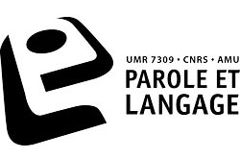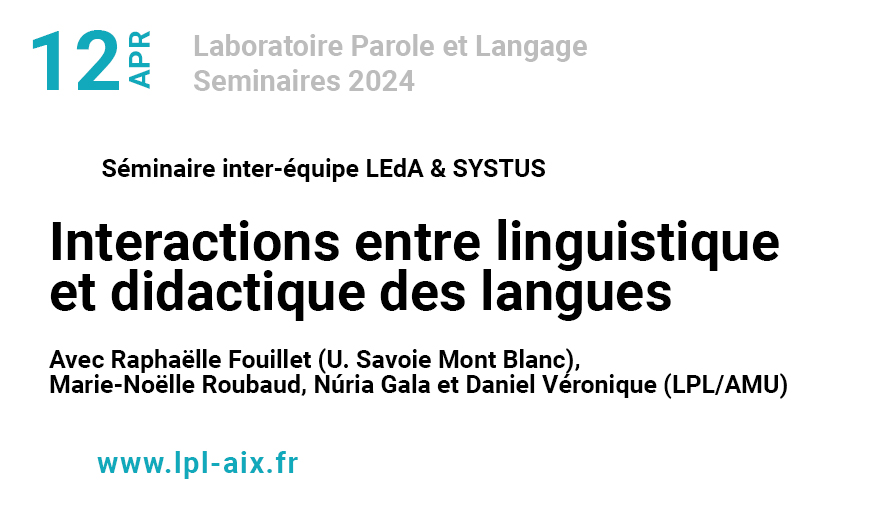Vendredi 12 avril 2024
Séminaire inter-équipe LEDA & SYSTUS
Avec les interventions de Raphaëlle Fouillet (U. Savoie Mont Blanc), Marie Noëlle Roubaud, Núria Gala et Daniel Véronique (LPL/AMU)
Interactions entre linguistique et didactique des langues
LPL, salle de conférences B011, Aix-en-Provence & En visio par Zoom
Séminaire ouvert à tout le monde
_______________
Programme
9h30 – 10h00 Accueil café à la cafeteria du LPL
10h00 – 11h00 Raphaëlle Fouillet (U. Savoie Mont Blanc) : La circulation des savoirs linguistiques dans l’enseignement de la grammaire du français aux allophones.
11h00 – 11h30 Marie Noëlle Roubaud et Núria Gala (AMU, LPL) : La polysémie mise à l’épreuve en cycle 3 (enfants de 9-11 ans). Étude de quelques verbes transdisciplinaires dans des textes scolaires d’histoire et sciences.
11h30 – 12h00 Daniel Véronique (AMU, LPL) : L’acquisition du verbe en français langue étrangère et son enseignement.
Résumés
Raphaëlle Fouillet
MCF en Sciences du langage - Didactique des langues-cultures
Université Savoie Mont Blanc
La circulation des savoirs linguistiques dans l’enseignement de la grammaire du français aux allophones
La grammaire, entendue au sens de l’« ensemble des principes qui régissent la combinaison d’éléments en chaînes significatives marquées et définies (les phrases) » (CECRL, 2001, p.89), est un domaine dont se préoccupent moins les didacticiens du français aux allophones (historiquement, le français langue étrangère) depuis que la langue est conçue comme une compétence de communication (Coste et al., 1976), où la composante linguistique n’est ni plus ni moins nécessaire que la composante pragmatique et la composante sociolinguistique (CECRL, 2001). Il n’en demeure pas moins que la grammaire est toujours bien présente, et dans les classes, et dans les manuels (Fougerouse, 2001 ; Beacco, 2010, 2021), ce qui suppose des descriptions grammaticales du français sur lesquelles s’appuient les enseignants et les apprenants.
La question se pose alors de savoir comment sont constituées ces descriptions grammaticales, et plus largement, comment circulent les savoirs grammaticaux, de leur élaboration en savoirs savants à leur transformation en objets d’enseignement et d’objets enseignés. Pour répondre à ce questionnement, on s’appuiera principalement sur la notion de transposition didactique, d’abord développée dans le cadre de la didactique des mathématiques par Chevallard (1991), qui en a défini les contours, et sur la distinction des quatre savoirs à l’œuvre dans la didactique des langues (Beacco, 2010).
Elles nous permettront de mettre en évidence un mouvement circulatoire des savoirs grammaticaux où un objet de savoir savant devient un objet d’enseignement - passage que nous illustrerons par l’introduction de syntagme dans l’enseignement du français aux allophones - et où un objet enseigné peut modifier un objet de savoir savant - processus que nous illustrerons par des descriptions grammaticales dans des manuels de français pour italophones.
Bibliographie
Beacco, J.-C. (2010). La didactique de la grammaire dans l’enseignement du français et des langues. Paris : Didier.
Chevallard, Y. (1991). La transposition didactique. Du savoir savant au savoir enseigné. Grenoble : La pensée sauvage éditions.
Fougerouse, M.-C. (2001). « L’enseignement de la grammaire en classe de français langue étrangère ». Dans Pratiques de l’enseignement et de l’apprentissage de la grammaire, Études de linguistique appliquée, n°122, pp. 165-178.
Marie Noëlle Roubaud et Núria Gala
Aix Marseille Université, Laboratoire Parole et Langage
La polysémie mise à l’épreuve en cycle 3 (enfants de 9-11 ans) - Étude de quelques verbes transdisciplinaires dans des textes scolaires d’histoire et sciences
L’école accorde-t-elle suffisamment d’importance aux verbes transdisciplinaires ? Cette question formulée par Sauvageau et al. (2021) mérite réflexion au regard de l’importance des connaissances du vocabulaire et de son impact pour la compréhension en lecture. En effet, le lien entre vocabulaire et lecture est bien établi : la connaissance du vocabulaire est fondamentale pour la compréhension des textes et, en même temps, la lecture est une activité qui contribue au développement du vocabulaire. Tout au long de son parcours scolaire, l’élève est confronté à des textes de spécialité qui lui permettent d’élargir son vocabulaire, au niveau du stock lexical (nouveaux mots) mais aussi au niveau de la profondeur lexicale : formes connues mais nouveaux sens spécifiques aux domaines de spécialité (Saidane et Tremblay, 2016). Il rencontre donc des verbes polysémiques dont il/elle pense connaître le sens alors que dans le texte de spécialité le sens courant amène à des incohérences et incompréhensions (Bensoussan, 1986).
Ainsi, l’élève de 9 – 11 ans, est-il conscient de ces nouveaux sens ? Il les devine peut-être en contexte et à l’aide de l’enseignant lors d’un travail explicite. Cependant, ces sens sont-ils vraiment intégrés ? L’élève est-il capable de les restituer en situation d’élicitation ? Telles sont les questions que nous nous sommes posées et qui ont été à l’origine d’une étude de vingt verbes transdisciplinaires apparaissant dans des textes d’histoire et de sciences en cycle 3 primaire.
Les résultats montrent que les sens spécifiques aux domaines de spécialité ciblés sont très peu (ou pas du tout) présents chez les élèves de cycle 3. L’étude a mis en évidence la pauvreté des connaissances lexicales liées aux domaines de spécialité, mais elle a aussi montré, au travers des stratégies lors des réponses, la place que prend l'enseignement grammatical et le poids qu’il a sur les élèves ainsi que les limites des manipulations sur la phrase. Ces résultats nous amènent à penser qu’il faut sensibiliser davantage les enseignants aux défis du travail sur le vocabulaire de spécialité.
Bibliographie
Bensoussan, M. (1986). Beyond vocabulary: Pragmatic factors in reading comprehension-Culture, convention, coherence, and cohesion. Foreign Language Annals, 19(5), 399-406.
Saidane, R. & Tremblay, O. (2016) Enseigner la polysémie des mots des manuels scolaires : pourquoi et comment ? Vivre le primaire, 29(4), 21-23.
Sauvageau, C, Beaudoin, A. & Tremblay, O. (2021). Observer, comprendre, représenter… Des verbes transdisciplinaires à enseigner au 1er cycle. Vivre le primaire, 34(2), 9-12.
Daniel Véronique
Aix Marseille Université, Laboratoire Parole et Langage
L’acquisition du verbe en français langue étrangère et son enseignement
La morphologie et la syntaxe du verbe français ont fait l’objet de nombreuses analyses en grammaire et linguistique françaises. Ces travaux éclairent les recherches sur l’acquisition du verbe en français langue étrangère et informent les chercheurs qui ont tenté de dégager des séquences d’acquisition du verbe français. L’ensemble de ces travaux sont susceptibles d’améliorer l’enseignement du groupe verbal en FLE. Dans cette intervention, je me propose i) de décrire différentes facettes de la morphosyntaxe du verbe français ; ii) de caractériser le développement de la maîtrise du verbe en FLE ; de proposer des pistes pour son enseignement. Mon intervention devrait illustrer les rapports entre les recherches linguistiques et les pratiques éducatives en FLE.










